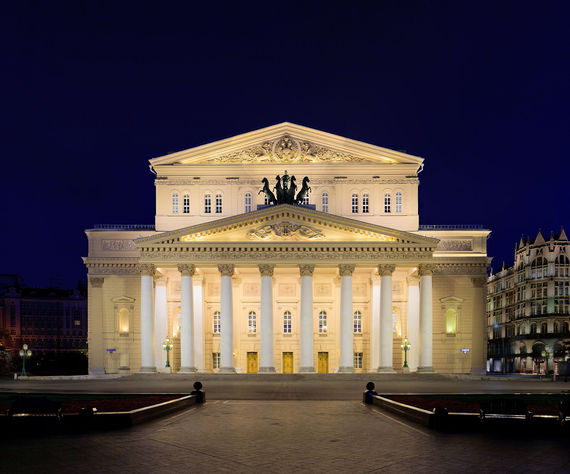Photo: Wikimedia Commons Dmitriy Guryanov
Amid the snowy scene of Moscow in winter, the Bolshoi Theatre presented Verdi's epic opera Don Carlo.
Why see an Italian opera in Russia? Historical context and a love of classical music unite Russia and Italy culturally and provide a rich backdrop for opera. Approaching the historic Bolshoi theatre in the center of Moscow prepares you to be transported to another era. The bright lights of Theatre Square welcome you into another world as you cross the threshold into the opulent foyer of the 19th century theatre.
Alongside the Bolshoi ballet company with premieres such as Swan Lake in 1877, the opera company generally specializes in the classics of Russian opera such as Mussorgsky's Boris Godunov, Glinka's A Life for the Tsar, and Rimsky-Korsakov's The Tsar's Bride, as well as the operas of Tchaikovsky. However, operas by several other composers are also performed, especially works of Italian composers.
The Bolshoi theatre opera company maintains several Italian operas in their repertoire, including a recent premiere of Don Pasquale, along with favorites like La Bohème, and La Traviata. In the 2016 season they presented Verdi's Don Carlo in honor of the Giuseppe Verdi Bicentennial.
The enchanting music in the nearly 4 hour original score of Don Carlo is characteristic of Verdi, brooding and emotional, yet complex. So, it should come as no surprise that it would be popular in a cosmopolitan and culturally diverse city like Moscow. The opera is based on the life of Carlos, Prince of Asturias, and was originally composed to be sung in French as Don Carlos, then was later translated to Italian to become the work Don Carlo.
The opening scene in the mid-December production of Don Carlo featured a bleak, snowy landscape, mirroring the season. The top-notch cast was primarily composed of members from Russian-speaking countries. The lead roles, including the protagonist Don Carlo, were expertly interpreted. Of note was the role Princess Eboli, a particularly popular role with Dramatic Mezzo Sopranos. Ekaterina Gubanova brought to the production her international experience with interpreting the role, including a recent performance at Teatro alla Scala, infusing her performance with passion and the rich tone and control of her voice. The dazzling choral work and expertly choreographed dance scenes added depth to the performance.
Why choose the Bolshoi Theatre to see an opera? It is true that in modern times the Bolshoi theatre has been more closely associated with Ballet, but the theatre has more to offer. The current theatre was opened in 1825, and serves as a perfectly adapted platform to show off an opera that had its debut in Bologna, Italy (Italian version) in the same general timeframe in 1867.
Longstanding cultural ties between Russia and Italy are evidenced by several lovely buildings constructed in both Moscow and St. Petersburg by architects of Italian descent. One such project was the Theatre Square project in Moscow which includes the current Bolshoi Theatre. The project was overseen by Joseph Bové, who was born in St. Petersburg to the family of Vincenzo Giovanni Bova, a painter from Naples, who settled in Russia in 1782.
After being steeped in the 19th century within the Bolshoi theatre, emerging into the frosty night braces you for re-entry into the present as you take in the enchanting snow-covered scene of Moscow at night.

